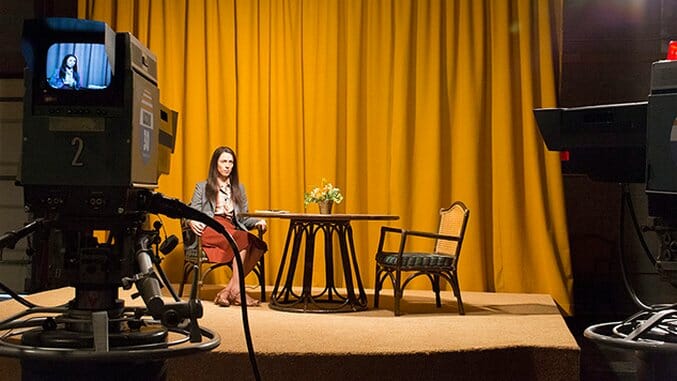
In considering Antonio Campos’s docudrama Christine, one can’t help but inevitably compare it to the other film about Christine Chubbuck that came out this year, Robert Greene’s Kate Plays Christine. It’s an easy angle to take, considering the nature of Greene’s film: a provocative blend of fiction and nonfiction elements that chronicles the efforts of actress Kate Lyn Sheil to research Chubbuck for a (fake) biopic about the Florida newscaster who infamously committed suicide on the air in 1974. Campos is basically making the kind of based-on-true-events kind of film that Greene attempts to deconstruct. In some ways, then, the game is already up for Campos before Christine even starts, especially in light of the baldly confrontational final scene of Kate Plays Christine, in which Sheil, dressed up as Chubbuck and on the verge of reenacting her suicide, turns a prop gun to the camera and basically castigates the audience for being so eager to see such a sordid moment recreated in the first place.
Campos’s film, it must be said, doesn’t entirely dispel Greene’s disturbing implications regarding the ultimate failure of fictional biopics to fully capture the elusive truths of real people and real life. (Heck, Kate Plays Christine itself is so deliberately thorny that it could be read as an argument against its own existence.) Yet, put aside any such preconceived notions, and Christine does exert an undeniable, if at times queasy, fascination, one that doesn’t always cast its makers in the most favorable light.
Some of that fascination comes from the fact that, at least as Campos and screenwriter Craig Shilowich have written her and Rebecca Hall has played her, Christine Chubbuck is a genuinely compelling figure, one who easily holds the screen by sheer virtue of her idiosyncrasies and air of elusiveness. As admirable as her focused, driven and ambitious work ethic was, hearing her flat, near-monotone voice, unlike that of head anchor George Peter Ryan (Michael C. Hall), is an immediate tell that she wasn’t exactly the kind of effortlessly magnetic personality who could easily engage an audience. When Christine’s demanding boss Michael (Tracy Letts) describes her as “too smart for the room,” one can intuitively see what he means with the aloof manner she generally maintains throughout.
Campos and Shilowich, however, refuse to cast any easy judgments on Chubbuck, neither condemning her for her personality flaws or excusing her because of her history of depression, the latter of which may have fed into her inability to form close relationships with anyone, romantically or otherwise. Instead, they seem to view their central figure with the detachment of psychologists observing a case study. That makes Christine sound like a chilly, skin-crawling experience—and in light of Campos’s previous features, Afterschool and Simon Killer, such a judgment could be expected, with both films as studies of similarly unsettled characters which exuded a Stanley Kubrick-like distance in their unnervingly poised compositions, immaculate sound design and behind-the-shoulder tracking shots. Unexpectedly, though, the subject seems to have loosened Campos up a bit stylistically: Christine feels at times positively jaunty compared to his earlier efforts, with the director indulging in exuberant rapid-fire montages during behind-the-scenes news-broadcast sequences and, perhaps most notably, allowing Danny Bensi and Saunder Juriaans’ score, as well as a few upbeat period tunes, to infuse the action with a light touch. It’s an ironic mode of address that suggests the kind of surface togetherness Christine struggled to maintain even as she was falling apart inside.
Even at its most involving, though, Christine never quite banishes the nagging question one might have about what the ultimate point of this whole enterprise is. With Christine continually frustrated by Michael’s taste for juicier stories without him ever really being able to explain to her satisfaction what he means by that, Campos’s film occasionally hints at being a critique of news media prizing sensationalism and ratings above all else. Paddy Chayefsky already made the same points with Network 40 years ago, and did so with far more venom to boot.
More fundamentally troubling is the fact that many viewers will go into this movie already aware of the bloody suicide that awaits them at the end, which makes the experience of watching Christine little more than a forced march toward a grimly inevitable destination. Rarely is there much of a sense that Campos and Shilowich gave any serious thought as to what they wanted viewers to take away from Christine Chubbuck’s sad life and tragic death beyond observing a slow-motion human trainwreck. Christine may inspire pity, but empathy is in crucially short supply.
Director: Antonio Campos
Writer: Craig Shilowich
Starring: Rebecca Hall, Michael C. Hall, Tracy Letts, Timothy Simons, J. Smith-Cameron, Maria Dizzia
Release Date: October 14, 2016
Kenji Fujishima is a freelance film critic, contributing to Slant Magazine, Brooklyn Magazine, The Playlist and The Village Voice. He is also Deputy Editor of Movie Mezzanine and former editor-in-chief of In Review Online. When he’s not watching movies and writing and editing film criticism, he’s trying to absorb as much music, art and literature as possible. He has not infrequently been called a “culture vulture” for that reason.